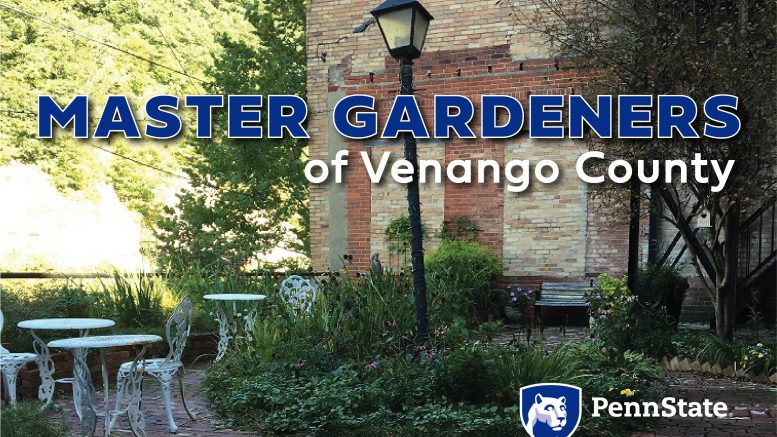This educational blog is a series of informative articles from the Penn State Master Gardeners volunteers plus news concerning our group and their activities.
Master Gardeners are volunteers trained by Penn State Extension Horticulture Educators. Once they complete their training, they cooperate with service agencies and community groups on a wide range of gardening projects. Their talents and energies are directed toward providing a link between their community and Penn State Cooperative Extension and Outreach.
Meet the Bloggers
Melissa Dolecki – Mercer/Venango County Coordinator (advisor)
Andy Faust – Area Coordinator (advisor)
Jan Martz – Master Gardener volunteer
Yvonne Paranick – Master Gardener volunteer
Gardening through the Seasons Article Series 2021
April (weekly)
Beginning a Vegetable Garden
Seed Starting Demystified & Information on Seed Packets
Rhubarb: Be patient and You Will Be Rewarded
Spring Fruit Tree Planting Tips for the Home Garden
May (weekly)
Spring Yard Care Tips for Water Quality
Don’t Over Fertilize Your Lawn this Spring
Meadows and Prairies: Wildlife-Friendly Alternatives to Lawn
Maximizing Your Vegetable Garden
Master Gardener Hotline
Venango County Master Gardener volunteers are available to answer gardening related questions through this blog site, at Venango County Master Gardeners on Facebook, emailing venangomg@psu.edu or by calling (814) 437-7607. Please leave a message.
Current Master Gardener Volunteer Projects
Victorian Garden behind the Transit Building, Oil City, PA
Children’s Learning Garden next to Central Elementary School, Franklin, PA
Poison Prevention Program
Venango Area Community Gardens
Seed to Supper Programs
Precious Paws Animal Rescue Pet Friendly Garden, Seneca, PA
Cranberry School District Project, Cranberry, PA
Bird, Butterfly and Pollinator Habitat at Oil Creek State Park
Two Mile County Park Project
Links
Find us on Facebook or Instagram
Penn State Master Gardeners of Venango County
How to Become a Master Gardener
The Penn State Extension Master Gardener basic training program is open to individuals interested in becoming volunteers and sharing gardening knowledge with the public through community outreach. The intensive horticultural training is taught by Extension educators and University professors.
Basic Training for Master Gardeners
The Master Gardener Program is administered at the county level where recruitment, training, and volunteer service occur. Master Gardener trainees are required to participate in a minimum of 40 hours of classroom training, score 80 percent on the final exam, and fulfill 50 hours of volunteer service.
Basic training class schedules vary based on location and include the following topics: botany, plant propagation, soil health and fertilizer management, composting, controlling pests safely, entomology, plant diseases, indoor plants, vegetables, lawn care, pruning, woody ornamentals, herbaceous plants, native plants, weeds and invasive plants. The training fee includes a copy of the Penn State Master Gardener Manual.
Each trainee is expected to attend all core classes with any missed sessions being made up by reviewing the online recorded training class.
Application
Before completing the Master Gardener application, contact the county Extension office in your area for an updated schedule of classes and program cost. Financial aid may be available through your local Extension office. Basic training for Master Gardeners is not offered annually in every county. Send the completed application to the county where you reside.
Questions
Contact your county Master Gardener program with any questions.
Download the How to Become a Master Gardener publication, which is also available in alternative media on request.
Penn State is committed to equal access to programs, facilities, admission and employment for all persons. It is the policy of the university to maintain an environment free of harassment and free of discrimination against any person because of age, race, color, ancestry, national origin, religion, creed, service in the uniformed services (as defined in state and federal law), veteran status, sex, sexual orientation, marital or family status, pregnancy, pregnancy-related conditions, physical or mental disability, gender, perceived gender, gender identity, gender expression, genetic information or political ideas. Discriminatory conduct and harassment, as well as sexual misconduct and relationship violence, violates the dignity of individuals, impedes the realization of the University’s educational mission, and will not be tolerated. Gender-based and sexual harassment, including sexual violence, are forms of gender discrimination in that they deny or limit an individual’s ability to participate in or benefit from University programs or activities.




































